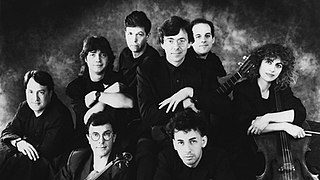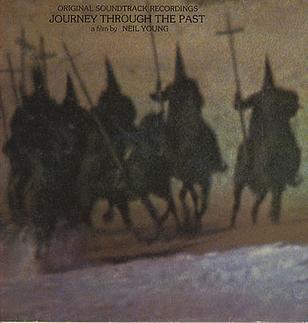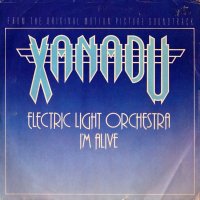
A musical ensemble, also known as a music group, musical group, or a band is a group of people who perform instrumental and/or vocal music, with the ensemble typically known by a distinct name. Some music ensembles consist solely of instrumentalists, such as the jazz quartet or the orchestra. Other music ensembles consist solely of singers, such as choirs and doo-wop groups. In both popular music and classical music, there are ensembles in which both instrumentalists and singers perform, such as the rock band or the Baroque chamber group for basso continuo and one or more singers. In classical music, trios or quartets either blend the sounds of musical instrument families or group instruments from the same instrument family, such as string ensembles or wind ensembles. Some ensembles blend the sounds of a variety of instrument families, such as the orchestra, which uses a string section, brass instruments, woodwinds, and percussion instruments, or the concert band, which uses brass, woodwinds, and percussion. In jazz ensembles or combos, the instruments typically include wind instruments, one or two chordal "comping" instruments, a bass instrument, and a drummer or percussionist. Jazz ensembles may be solely instrumental, or they may consist of a group of instruments accompanying one or more singers. In rock and pop ensembles, usually called rock bands or pop bands, there are usually guitars and keyboards, one or more singers, and a rhythm section made up of a bass guitar and drum kit.

Mr. Holland's Opus is a 1995 American drama film directed by Stephen Herek, produced by Ted Field, Robert W. Cort, and Michael Nolin, and written by Patrick Sheane Duncan. The film stars Richard Dreyfuss in the title role of Glenn Holland, a dedicated high-school music teacher who attempts to compose his own music while struggling to balance his job and life with his wife and profoundly deaf son. The cast also includes Glenne Headly, Olympia Dukakis, William H. Macy, and Jay Thomas.

Michael Arnold Kamen was an American composer, orchestral arranger, orchestral conductor, songwriter, record producer and musician.

Accompaniment is the musical part which provides the rhythmic and/or harmonic support for the melody or main themes of a song or instrumental piece. There are many different styles and types of accompaniment in different genres and styles of music. In homophonic music, the main accompaniment approach used in popular music, a clear vocal melody is supported by subordinate chords. In popular music and traditional music, the accompaniment parts typically provide the "beat" for the music and outline the chord progression of the song or instrumental piece.

Face the Music is the fifth studio album by Electric Light Orchestra (ELO). It was released in September 1975 by United Artists Records and on 14 November 1975 in the United Kingdom by Jet Records. The album moves away from the large-scale classical orchestrated sound of the previous album, Eldorado, in favour of more "radio-friendly" pop/rock songs, though the string sections are still very prominent. The new sound proved successful for the group, for Face the Music was the first ELO album to go platinum.

The Penguin Cafe Orchestra (PCO) were an avant-pop band led by English guitarist Simon Jeffes. Co-founded with cellist Helen Liebmann, the band toured extensively during the 1980s and 1990s. The band's sound is not easily categorized, having elements of exuberant folk music and a minimalist aesthetic occasionally reminiscent of composers such as Philip Glass.

Uncle Meat is the sixth album by the Mothers of Invention, and seventh overall by Frank Zappa, released as a double album in 1969. Uncle Meat was originally developed as a part of No Commercial Potential, a project which spawned three other albums sharing a conceptual connection: We're Only in It for the Money, Lumpy Gravy and Cruising with Ruben & the Jets.

"Nothing Else Matters" is a power ballad by American heavy metal band Metallica. It was released in 1992 as the third single from their self-titled fifth studio album, Metallica. The song peaked at number 11 on the Billboard Mainstream Rock Tracks chart, number 6 on the UK Singles Chart, number 1 in Denmark, and reached the top ten on many other European charts. Recognized as one of Metallica's best known and most popular songs, it has become a staple in live performances.

Retro Active is a compilation album by the English rock band Def Leppard, released in 1993. The album features touched-up versions of B-sides and previously unreleased recordings from the band's recording sessions from 1984 to 1993. The album charted at number 9 on the Billboard 200 and No. 6 on the UK Albums Chart.

Ernesto Acher is an Argentine comedian, actor, composer, arranger, multi-instrumentalist and orchestral conductor. Between 1971 and 1986 he was a member of the celebrated Argentine group Les Luthiers, with which he acted as composer, comedian, singer, and performer on more than twenty instruments, some of which he created himself. Before separating from the group, he was involved in individual projects as composer – including a soundtrack, a quartet for clarinet and strings, a string sextet and a symphonic poem for viola and orchestra. In 1988 he founded the La Banda Elástica (The Elastic Band), gathering some of the most outstanding Argentine jazz musicians. The band dissolved in 1993. Since then he has developed several musical and comedy projects, and performed as an orchestral conductor.

Michael Gordon is an American composer and co-founder of the Bang on a Can music collective and festival. He grew up in Nicaragua.
The New York Rock & Roll Ensemble was a rock band active in the late 1960s and early 1970s, whose music was described as "classical baroque rock". The group performed wearing classical musician's attire, white tie and tailcoat.

Journey Through the Past is a double LP soundtrack album from the film of the same name by Canadian / American musician Neil Young, released in November 1972 on Reprise Records, catalogue number 2XS 6480. It peaked at #45 on the Billboard 200. Its initial release was on vinyl, cassette tape, reel-to-reel tape, and 8-track tape cartridge. Although its follow-up Time Fades Away was finally released on CD in August 2017, Journey Through the Past remains the only 1970s Neil Young album yet to see an official CD reissue.

"Mr. Blue Sky" is a song by the Electric Light Orchestra (ELO), featured on the band's seventh studio album Out of the Blue (1977). Written and produced by frontman Jeff Lynne, the song forms the fourth and final track of the "Concerto for a Rainy Day" suite on side three of the original double album. "Mr. Blue Sky" was the second single to be taken from Out of the Blue, peaking at number 6 in the UK Singles Chart and number 35 in the US Billboard Charts.

"I'm Alive" is a song by the Electric Light Orchestra (ELO), released as a single in May 1980. It is featured in a sequence near the beginning of the feature film Xanadu. The song also appears on the soundtrack album Xanadu.

Serenada Schizophrana is a suite of six symphonic movements written by American film composer Danny Elfman in 2004. It was commissioned by the American Composers Orchestra, which premiered the work at Carnegie Hall in New York City on February 23, 2005, conducted by Stephen Sloane. A studio recording was released on October 3, 2006, with John Mauceri conducting the Hollywood Studio Symphony orchestra. Album art was done by George Condo.

Timothy Wesley John Brady is a Canadian composer, electric guitarist, improvising musician, concert producer, record producer and cultural activist. Working in the field of contemporary classical music, experimental music, and musique actuelle, his compositions utilize a variety of styles from serialism to minimalism and often incorporate modern instruments such as electric guitars and other electroacoustic instruments. His music is marked by a synthesis of musical languages, having developed an ability to use elements of many musical styles while retaining a strong sense of personal expression. Some of his early recognized works are the 1982 orchestral pieces Variants and Visions, his Chamber Concerto (1985), the chamber trio ...in the Wake..., and his song cycle Revolutionary Songs (1994).

Unarmed – Best of 25th Anniversary is the sixth compilation album by German power metal band Helloween. It is a compilation in celebration of the band's 25th anniversary, which contains re-recorded versions of Helloween songs in an acoustic/symphonic style. It includes a 70-piece Prague Symphony Orchestra performing "The Keeper's Trilogy", a 17-minute medley consisting of the songs "Halloween", "Keeper of the Seven Keys" and "The King for a 1000 Years". Many guest musicians are featured on the tracks.
Nicole Lizée is a Canadian composer of contemporary music. She was born in Gravelbourg, Saskatchewan and received a MMus from McGill University. She lives in Montreal, Quebec. At one time, she was a member of The Besnard Lakes, an indie rock band from Montreal.

S&M2 (stylized as S&M2; an abbreviation of Symphony and Metallica 2) is a live album by American thrash metal band Metallica and the San Francisco Symphony. It is a follow-up to S&M, a live collaborative album released in 1999. The album was recorded during a live performance in San Francisco at the Chase Center in 2019. The performance was also filmed and released theatrically on October 9, 2019.

















